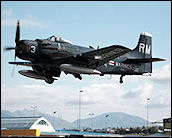 Apparently it is not a job requirement at Immigration and Customs Enforcement to have to understand the laws that you are charged with enforcing, as this recent press release from ICE illustrates all too well. The press release announces the forfeiture of a Douglas AD-4N Skyraider and associated parts that were alleged to have been illegally imported into the United States.
Apparently it is not a job requirement at Immigration and Customs Enforcement to have to understand the laws that you are charged with enforcing, as this recent press release from ICE illustrates all too well. The press release announces the forfeiture of a Douglas AD-4N Skyraider and associated parts that were alleged to have been illegally imported into the United States.
Now let’s hear about the case from Special Agent Raymond R. Parmer, Jr., who quickly reveals that he doesn’t understand at least some of the laws that the taxpayers pay him to enforce:
“The Skyraider aircraft, its cannons and parts are all subject to import licensing requirements as ‘defense articles’ under the Arms Export Control Act. Federal law prohibits the importation of defense articles without a license or permit,” said Raymond R. Parmer, Jr., special agent in charge of Homeland Security Investigations (HSI) in New Orleans. “ICE aggressively investigates these cases in order to deter this type of illegal activity and protect those who abide by our nation’s laws.” Parmer oversees responsibility for the states of Alabama, Mississippi, Arkansas, Tennessee and Louisiana.
Er, no. The aircraft and the cannons are subject to import licensing requirements as “defense articles.” The parts, well, not so much. Permanent imports of defense articles into the United States are governed by the United States Munitions Import List, which is a subset of the United States Munitions List. Not everything on the USML requires a license for permanent (as opposed to temporary) import into the United States. And aircraft parts are one of those things.
Aircraft parts are covered by Category VIII(h) of the USML. Now let’s take a look at Category VIII of the USMIL:
NOTE: Category VIII (b) through (j) and Categories IX, X, XI, XII and XIII of ‘‘Munitions List’’ deleted as inapplicable to imports
Oops. Maybe Agent Parmer ought to try actually reading the USMIL before speaking up in a press release about what does and does not require an import license.
Not surprisingly, this is not the first time of which I am aware where ICE agents failed to understand that the USML and the USMIL are not co-extensive. I was involved in a case where my client was being prosecuted for illegal exports that the client was alleged to have made to undercover federal agents. During the course of plea negotiations, an ICE agent came zooming in with an announcement that Customs had seized some military electronics that my client was said to be illegally importing without a license, citing Category XI of the USML. The agent urged additional criminal charges and the end of the plea-bargain discussions. I pointed out to the U.S. Attorney involved that Category XI was not on the USMIL and that permanent imports of military electronics did not require a license. He was sufficiently irate over the ICE agent’s misrepresentation of applicable law that he made the agent personally deliver the improperly seized items to my client at my client’s facility.
 Permalink
Permalink
Copyright © 2012 Clif Burns. All Rights Reserved.
(No republication, syndication or use permitted without my consent.)

 Posted by
Posted by  Category:
Category: 

